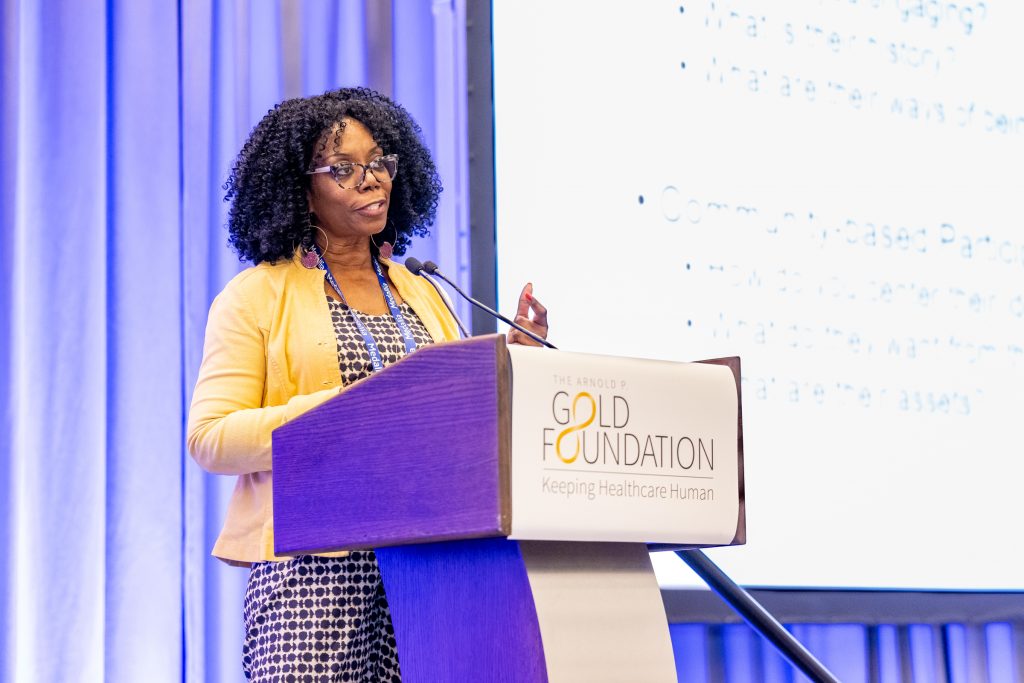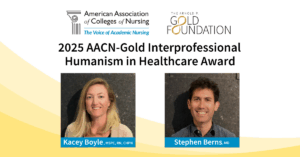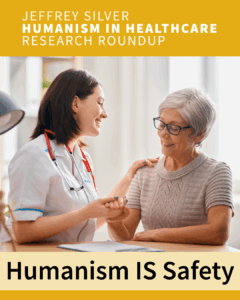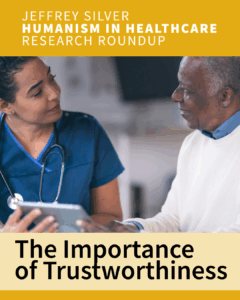At the 2024 Gold Humanism Summit, Dr. Ruby Mendenhall and Dr. Kathleen Reeves shared how deeper community connections can improve medicine
Dr. Ruby Mendenhall took the stage at the 2024 Gold Humanism Summit, held February 29-March 2 in Atlanta, for a session titled “The Community Ecosystem: Caring for the Person in Front of You by Understanding Their Story.” She was joined by Gold Foundation President and CEO Dr. Kathleen Reeves. Both are pioneers in community engagement around health.

Dr. Ruby Mendenhall speaks at the 2024 Gold Humanism Summit
A medical school leader and award-winning researcher, Dr. Mendenhall was inducted into the Gold Humanism Honor Society at the Summit. She is also the new Poet Laureate for Urbana, Illinois. In true literary fashion, Dr. Mendenhall began the session by reciting a poem that she had written in the fourth grade about Dr. Martin Luther King Jr.’s tragic passing. Dr. King is buried in Atlanta, less than a mile from the Gold conference.
Dr. Mendenhall read, in part:
His followers mourn
and long to know
Will his dream live on?
Will his words be so?
The tender words captured how Dr. Mendenhall and Dr. Reeves both see their work: through the diverse and complex voices of community.
Seeing the person behind the data point
Dr. Mendenhall is the Kathryn Lee Baynes Dallenbach Professor in Liberal Arts and Sciences at the University of Illinois Urbana-Champaign and Co-Director of STEM Illinois. She is also the Associate Dean for Diversity and Democratization of Health Innovation at the Carle Illinois College of Medicine.
In 2021, the Gold Foundation honored Dr. Mendenhall with the Pearl Birnbaum Hurwitz Humanism in Healthcare Award for galvanizing students, faculty, community groups, and citizen scientists to advance the shared quest for a more equitable, healthy, and just world for all.
Her research, which has been funded by the National Science Foundation, includes examinations of the mental and physical toll of high levels of violence. Dr. Mendenhall parses crime statistics, police records, and data from 911 calls.
She recognizes that data can only tell part of the story. Dr. Mendenhall believes in inviting communities to participate in scientific research and hearing their stories.
At the Gold Humanism Summit, Dr. Mendenhall explained how she used genomic tools to explore the health toll that Black mothers and children experience as a result of living in racially segregated neighborhoods with high levels of violence.
Dr. Mendenhall told the audience about when she and her team interviewed nearly 100 single Black mothers experiencing trauma and grief. She wasn’t sure how the women would react to being asked to provide blood samples, which could measure how stress from gun violence may be affecting their immune system.
The mothers explained how they were trying to find ways to address their mental and physical health, as the continual threat had taken a toll on their immune system. Some shared how they found peace and healing in the safe space of their homes while others used music and mindfulness techniques.
A common theme emerged.
All of them were yearning for their stories to be heard.
Finding the context in community
While Dr. Mendenhall was effecting change for communities in Illinois, Dr. Reeves was leading efforts for a parallel story taking shape in North Philadelphia.

Dr. Mendenhall was joined by Gold Foundation President and CEO Dr. Kathleen Reeves.
Before she joined the Gold Foundation in summer 2023, Dr. Reeves was the Founding Director of the Center for Urban Bioethics at the Lewis Katz School of Medicine at Temple University, among many other leadership roles. The groundbreaking center was established in 2010 and grew to a staff of more than 50 interdisciplinary educators, researchers, program staff, and outreach workers.
During the height of the COVID-19 pandemic, a high number of Latinx patients were being admitted to the Temple University Hospital with the illness. Dr. Reeves remembers the hospital consulting with the Center for Urban Bioethics for guidance on how to address the rise in cases within the community. In response, the center formed a group called the North Philadelphia Collective. It was composed of leaders from churches, community centers, schools, city blocks, community organizations, and community development corporations.
The group met twice a week and arrived at very important understandings.
Through this community engagement, the group discovered that most of the patients from the community who were affected with COVID were following the advice they’d been given: to socially distance from everyone but close family. However, many of their family members were traveling from New York and other states to gather, which was impacting the spread of the virus.
In addition, informational materials about COVID were being printed only in English and therefore, not universally accessible. The North Philadelphia Collective recommended that Spanish-language materials be created and placed in bags at grocery stores in the heart of the community.
Through this intervention, the number of COVID cases in the community went down considerably, Dr. Reeves explained.
In a similar way, COVID vaccination initiatives needed to take into account a deeper understanding of the North Philadelphia community.
“They’re not vaccine hesitant,” Dr. Reeves said. “They are just insisting to get vaccinated in a place that they trust.”
When vaccination efforts were moved into a trusted local church, for example, there was a waiting list for weeks.
A Chicago Renaissance
Like Dr. Reeves, Dr. Mendenhall also believes in leveraging new insights and innovation to solve systemic issues.
Dr. Mendenhall’s efforts are focused on democratizing healthcare and education for women and children.

Dr. Mendenhall pictured with her Gold Humanism Honor Society certificate
She recalled that, at a conference, a speaker described “society as a squeezy ball that when you apply pressure, it changes. But once you stop, it takes its original shape back.”
Dr. Mendenhall keeps this in mind with her own work. “And so, when I think about a third reconstruction (the first reconstruction after slavery, the second after the Civil Rights era, and now at this historical moment), I think about what things can we do that fundamentally shape the way that society is today?” she said.
With funding from the MacArthur Foundation, Dr. Mendenhall is designing what she calls a Third Reconstruction and Chicago Renaissance by training 50 Black and Latinx youth and young adults as community health workers and citizen/community scientists.
The goal is to place young people at the center of efforts to address racial trauma in the form of gun violence, crime, and higher rates of COVID deaths and long-term illnesses.
“With the knowledge that they already have about their communities and about what young people are experiencing, how can we work with them to bring that new knowledge to the forefront of science?” asked Dr. Mendenhall.
She believes that the answer is to empower the youth.
Dr. Mendenhall has done this by entrusting them as partners in the creation of their training curriculum as community health workers.
In this role, young people learned to perform basic health assessments and connect residents with community resources to help address their health and wellness needs.
The students also serve as interns across community organizations, health centers, and colleges/universities in Chicago, with the hope of creating pathways into careers or higher education.
As Dr. Mendenhall’s younger self had written in her poem,
We give honor to Dr. King
and the others, too
who challenge America
to let her words be true.
Dr. Mendenhall is helping America keep her promise.
To learn about Dr. Mendenhall’s inspirations, thoughts on humanism in healthcare, and much more, read her interview in the “8 Questions with ….” Series, which spotlights members of the Gold community.


